Six of Hearts: Songs for Mary Wiegold
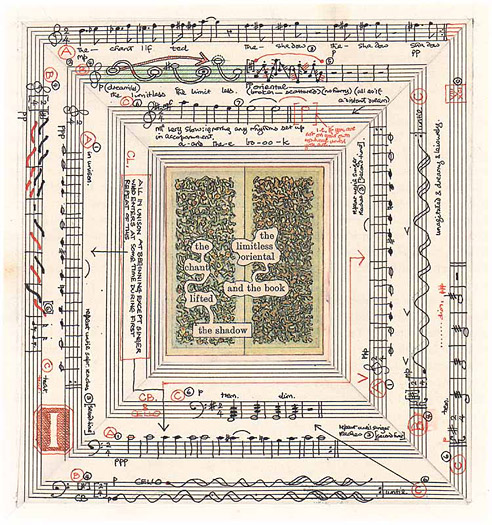
Opus 16
No 1. The Chant Lifted The Shadow
collage and ink
1991
Listen to audio in the notes below
Notes on this work
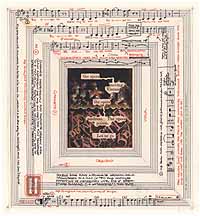
Six of Hearts: no. 2 The Opera
Opus 16, collage and ink, 1991
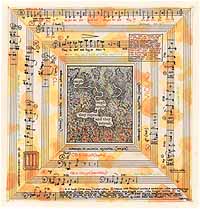
Six of Hearts: no. 3 Omple Omple
Opus 16, collage and ink, 1991
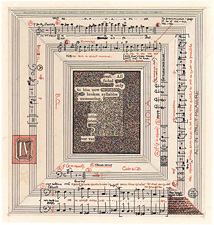
Six of Hearts: no. 4 Rest
Opus 16, collage and ink, 1991
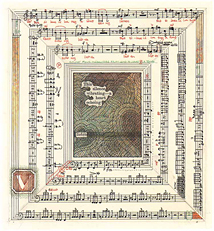
Six of Hearts: no. 5 This Silence Vibrating
Opus 16, collage and ink, 1991
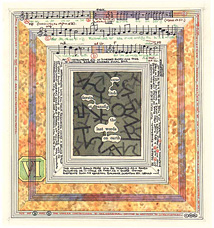
Six of Hearts: no. 6 The Last Words On Earth
Opus 16, collage and ink, 1991
Six of Hearts: Songs for Mary Wiegold performed by Mary Wiegold and the Composers Ensemble, conducted by John Woolrich, recorded at St Silas Church, London, December 1993
1. The Chant Lifted The Shadow
2. The Opera (moving Vienna)
3. Omple Omple
4. Rest (broken syllables)
5. This Silence Vibrating
6. The Last Words On Earth
Apart from the collaboration with Jean-Yves Bosseur on the performance version of Last Notes from Endenich I had written no music for almost twenty years. My excursions into composition seemed to belong to a brief, permissively experimental moment in the English avant- garde when interesting bridges were built between music and the visual arts. In the sixties there was an especially strong presence of composers and musicians in English art schools. I was partly responsible for the frequent visits by progressive American composers (Feldman, Cage, Wolff etc.) to colleges of art, where they were more likely to get a sympathetic hearing than in the concert hall. British composers often had useful sinecures in the cunningly ill-defined area of 'liberal studies'. Cornelius Cardew, of whose Scratch Orchestra I was a founder member, could exhibit his Treatise in a gallery: it seemed logical therefore that a painter could place his work on a music stand.
But those days had long since passed and there seemed now to be no context in which to carry on my frail musical odyssey, nor anyone to notice that I was becalmed. In the eighties however there was a discernable spate of performances of IRMA, mainly by student groups.
In 1991 John Woolrich phoned me out of the blue and asked me if I would write a song for Mary Wiegold and Composers Ensemble. My cautious response could best be described as diffidently enthusiastic. I was keen, but apprehensive. Since this work was to take its place in a songbook together with pieces by composers that I admired (Harrison Birtwistle, Howard Skempton etc.) I feared a comparison that I had never really invited. Having agreed that I would try something miniature to a text of my own, I invited Mary Wiegold to choose some pages of A Heart of A Humument which had words that appealed to her. She chose five and I added another so that I could call the pieces Six of Hearts, thereby threading in my obsessive way three works together, the songs, the book and a playing-card that I had once designed, a cut-up version of which appears in one of the pages.
For all their slenderness and brevity I found the songs torturously difficult to write. They caused me much anxiety, as did the prospect of going down to Dartington Hall to hear them rehearsed and performed in public. Yet it was auspicious that they were to get their first airing in the place where their Ur-lyricist W.H. Mallock was born. Better still I found the songs were in safe and sympathetic hands. John Woolrich directed the Ensemble with understanding and Mary Wiegold (who as everyone should know sings like a dream) intuited their fragile atmosphere straight away. The audience was appreciative and now, once again, I have manuscript paper and pencil on top of my keyboard.
